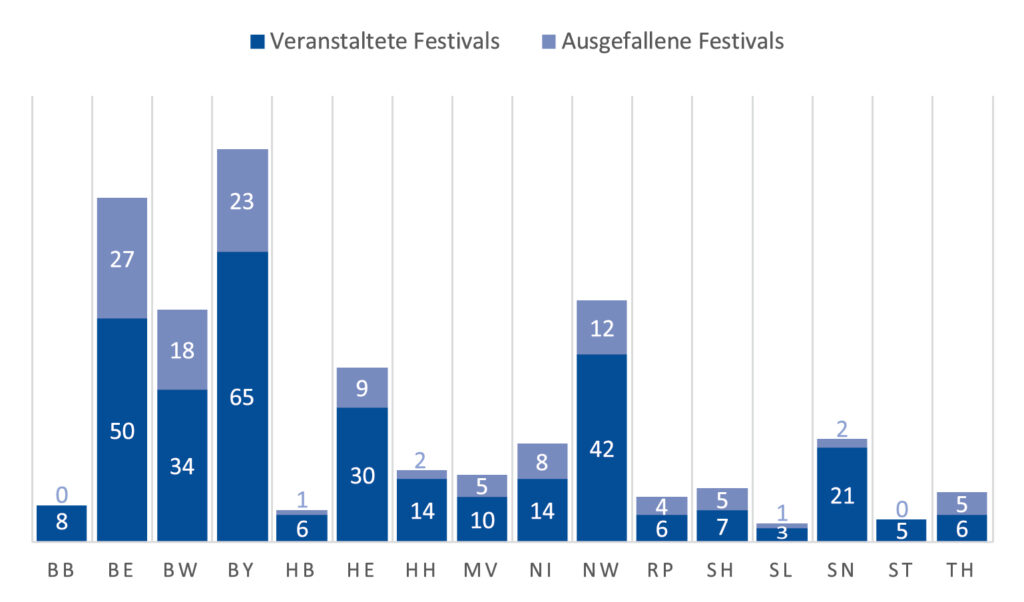On March 22, 2020, with only a six-day lead-in as a result of the Covid 19 pandemic, the first lockdown began in Germany, causing a series of cancellations and postponements of film festivals to an unknown date in the future. However, as early as the beginning of April, the first film festivals announced their intention to support basic cultural services for the population as well as film culture and thus the film industry as a whole, especially in these times. These statements set the starting point for a Germany-wide commitment of the film festival sector, which was accompanied by numerous new developments: on the Internet, in drive-in cinemas, in the town square and on local tv-stations. With LICHTER Filmfest Frankfurt International, International Short Film Festival Oberhausen, DOK. fest Munich, International Festival of Animated Film Stuttgart (ITFS), Filmkunstfest Mecklenburg-Vorpommern up to Short Film Festival Thalmässing and FiSH Film Festival in Rostock, a movement began to present film culture against all obstacles and to open it up to a Germany-wide audience with great success.
An impression of the vitality of the sector in the second pandemic year 2021 is shown in the following chart:

A comparison with the reference values for the entirety of film festivals shows that in particular the federal states with a high volume of festivals in the pandemic year 2021 also suffered the highest losses, while other locations were able to (almost) completely cushion the effects in purely quantitative terms. Nevertheless, in view of factors such as the temporal shifts and the extensions of the radius of action of some festivals by means of virtual editions, it is difficult to answer whether Bavaria, with a loss of 23 festivals (26%), was in fact more strongly affected by the 2021 pandemic than Berlin with 27 losses (35%) or Thuringia with 5 festivals (45%).
All the analyses presented here first published under the title: Die deutsche Filmfestivallandschaft. Analyse eines Sektors im Wandel in der Publikation Filmfestivals: Krisen, Chancen, Perspektiven, Tanja C. Krainhöfer/ Joachim Kurz (Hrsg.), edition text+kritik, 2022
Today, a number of scholarly works complement the changing picture of the film festival sector, most notably the publication film festivals and the first wave of COVID-19: Challenges, opportunities, and reflections on festivals’ relations to crises von Marijke de Valck und Antoine Damiens (2020) and European Film Festivals in Transition. Film Festival Formats in Times of COVID von Roderik Smits (2021)
Valuable results on strategies and measures to cope with the crisis caused by the pandemic specifically on the part of German film festivals are also offered by the following papers:
Nastassja Kreft, Filmfestivals im Kontext einer globalen Pandemie. Herausforderungen und Potenziale digitaler Screenings und sozialer Interaktion im virtuellen Raum, Master-Arbeit, Filmuniversität Babelsberg Konrad Wolf, Potsdam 2021
Clemens Meyer, Strategien von Filmfestivals in Deutschland im Umgang mit den durch die COVID-19 Pandemie geltenden Einschränkungen unter dem Gesichtspunkt der wirtschaftlichen Bedeutung der Festivals für den deutschen Film, Bachelor-Arbeit, Hochschule für Musik, Theater und Medien Hannover, Institut für Journalistik und Kommunikationsforschung, Hannover 2021
Sophia Zimmermann, Hybrid — Das Beste aus zwei Welten? Analyse der Potentiale, Herausforderungen und Voraussetzungen einer hybriden Umsetzung des Filmprogramms von Dokumentarfilmfestivals, Master-Arbeit, Hochschule für Musik und Theater Hamburg, Institut für Kultur- und Medienmanagement, Hamburg 2022
Further studies on the impact of the pandemic:
Changsong, Wang Lucyann Kerry, Rustono Farady Marta. (2021) Film distribution by video streaming platforms across Southeast Asia during COVID-19. Media, Culture & Society 43:8, pages 1542-1552.
Hanzlík, Jan, Ewa Mazierska. (2022) Eastern European film festivals: streaming through the covid-19 pandemic. Studies in Eastern European Cinema 13:1, pages 38-55
Melnychenko, Svitlana Anatolii Mazaraki, Nadiia Vedmid, Alla Okhrimenko, Aliona Shtanova. (2021) Communication policy of cinema industry enterprises in the context of COVID-19 (on the example of cinema chains). Innovative Marketing 17:2, pages 112-124.
Valck de, Marijke, Antoine Damiens (ed.), Rethinking Film Festivals in the Pandemic Era and After. Basingstoke, Hampshire: Plagrave Macmilian. Publication expected in Nov. 2022
Anheier, Helmut K. (Hertie School), Janet Merkel (TU Berlin) und Katrin Winkler (Hertie School), Culture, the Arts and the COVID-19 Pandemic. Five cultural capitals in search of solutions. Berlin: Allianz Kulturstiftung
